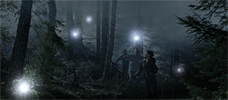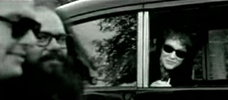Reviews
The Real Life of Angel Deverell
François Ozon
France / UK / Belgium, 2007
Credits
Review by Tom Huddleston
Posted on 12 November 2007
Source Lion’s Gate 35mm print
Categories The Times BFI 51st London Film Festival
One of the great joys of film festival attendance is that every so often you stumble across something completely, wondrously unexpected. Unfamiliar with the previous work of François Ozon, I wandered into Angel with almost no preconceptions beyond the fact that it was a new work by a widely respected director, and a romantic costume drama with a literary theme. But this is like no costume drama ever made: Angel is a jet black, vicious comedy, a wonderfully sly character piece, simultaneously a giddy pastiche and rapturous celebration of a unique and painfully familiar world, that of the romantic novel.
From its chocolate box opening titles to its surprisingly emotive graveyard ending, Angel continually toys with the rules and clichés of a well established narrative form. Stories like this have been around for (at least) centuries, and in that time have acquired a rigid set of rules, stock characters and locations: the rags-to-riches peasant girl, the doting mother, the gossipy aunt, the caddish but deeply sensual varlet, the avuncular businessman; the room above the grocer’s shop, the bustling streets of London, the sprawling country estate. Ozon’s gift is to take these hoary old formulae and heighten them, adding intensity and satirical bite. So the put-upon peasant girl with dreams of literary stardom becomes a stroppy, self serving monster, the doting mother becomes a hapless doormat for her daughter’s megalomania, even the cad is trampled underfoot, losing his leg in the first war and succumbing to abject depression.
Based on a novel by Elizabeth Taylor, the narrative is predictable, but in the best sort of way, familiar and even comforting. Angel Deverell grows up above the aforementioned grocer’s shop, an only child to a single parent. But she dreams of better things, gazing misty-eyed through the steel gates of nearby Paradise House, the mansion on the hill. She also dreams of literary success, churning out pages and pages of populist, romantic drivel which soon catches the eye of publisher Theo. Naturally she is an instant smash, and in a few short years has accrued enough wealth to buy not only Paradise, but her very own snarling, untamed husband Esme, a rough-edged artist who only marries Angel for her money. But when her mother dies and Esme goes off to war, Angel is left alone with only her long suffering secretary Nora for company. Mistrustful of all around her and facing bankruptcy, Angel’s fragile psyche begins to unravel.
It’s almost impossible to describe the crafty, infinitely sly pleasures that Angel delivers. Ozon isn’t afraid to take well aimed potshots at very modern cultural trends, turning his film into a damning critique of celebrity and self worship, consumer culture, class and social aspiration, perhaps even the anti-war brigade. All of these themes find focus in his central character, a grasping, infinitely self involved, barely human creature of pure want. Romola Garai excels in the role, chewing the scenery and relishing the opportunity to let rip in high, old fashioned style. She’s like a stage school brat gone berserk, a tornado of self-interest pulling in those around her, whether they like it or not.
Ozon is aware that Angel’s novels - and by extension his own source works, and even the film itself - are pure trash, cheap fodder for the undiscerning. The authoress knocks out her stories in a matter of weeks, and blankly refuses to rewrite, even when her descriptions of pregnancy and childbirth or high social rituals are hopelessly misinformed. But nevertheless she becomes a star, appealing not just to the masses but to the supposedly discriminating upper crust, who appreciate her immense wealth if nothing else. Whenever financial trouble threatens Angel can just bash out another bestseller, and no one will question her: one sees shades of Jilly Cooper and Barbara Cartland, and the faceless hacks at Mills & Boon, getting rich off other people’s gullibility. But how much is Ozon condemning these authors, or their readership? It’s clear he appreciates the lure of a good melodrama, and Angel delivers admirably on that level, too: it’s hugely entertaining, as much for its spicy surface narrative and shallow stock characters as for its satirical undercurrent. So are we, the audience, the suckers here? Or are the real fools the literary snobs who just can’t allow themselves to appreciate the pleasures of a genuinely mindless experience?
Aesthetically, Angel is a treat for fans of high camp, stuffed with intricate frilly dresses and ornate furnishing, all the trappings of turn-of-the-century aristocratic style. The music is sweeping and delirious, as is the camerawork, taking cues from Douglas Sirk and Max Ophuls, and all the kings of classic Hollywood melodrama. Visually, the film plays it largely straight, but Ozon can’t resist a few sneaky digs at the old special effects masters, and the new: one repeated image is of a carriage sweeping through the city streets, backed by an obviously fake, clearly digitised backdrop, a sort of wry 21st century version of cheap 1950’s back projection. It’s all fakery, Ozon is saying, no matter how real they can make it look. The techniques may have changed, but the stories and their effect on us remain the same.
This is perhaps the great joy of Angel: nothing is as simple as it seems. Every seemingly easy, obvious jibe, whether it be at the consumer or the art-snob, the author or her characters or even the audience, has an equally persuasive and justifiable counter argument, and Ozon juggles expertly, never allowing us to fall into simple patterns of judgment but requiring us to keep alert for each new sardonic twist. And by the end some sort of miracle has occurred: despite ourselves, and seemingly the best efforts of the director, we’ve actually begun to care for these characters: helpless, crippled Esme, caring, concerned Theo, and especially Nora, with her long held, unspoken desire for Angel unbroken in the face of a decade of cruelty and mistreatment. Even Angel herself becomes a figure of, if not actual sympathy, then a kind of understanding pity, lost in her made-up world, dreaming of a past that only ever existed in her imagination. It’s a startling double-bluff from Ozon, totally unexpected but hugely welcome, the icing on a very rich, decadent, overstuffed but decidedly tasty cake.
More The Times BFI 51st London Film Festival
-

Island of Lost Souls
2007 -

Garage
2007 -

Exodus
2007 -

Friends of Jesus
2007 -

We Want Roses Too
2007 -

The Trap
2006 -

Captain Ahab
2007 -

Shotgun Stories
2007 -

Savage Grace
2007 -

The Assassination of Jesse James by the Coward Robert Ford
2007 -

The World Unseen
2007 -

Things We Lost In The Fire
2007 -

Lions for Lambs
2007 -

Talk to Me
2007 -

Redacted
2007 -

Battle For Haditha
2007 -

Chaotic Ana
2007 -

Angel
2007 -

Juno
2007 -

Fay Grim
2006 -

Reservation Road
2007 -

I’m Not There
2007
We don’t do comments anymore, but you may contact us here or find us on Twitter or Facebook.



